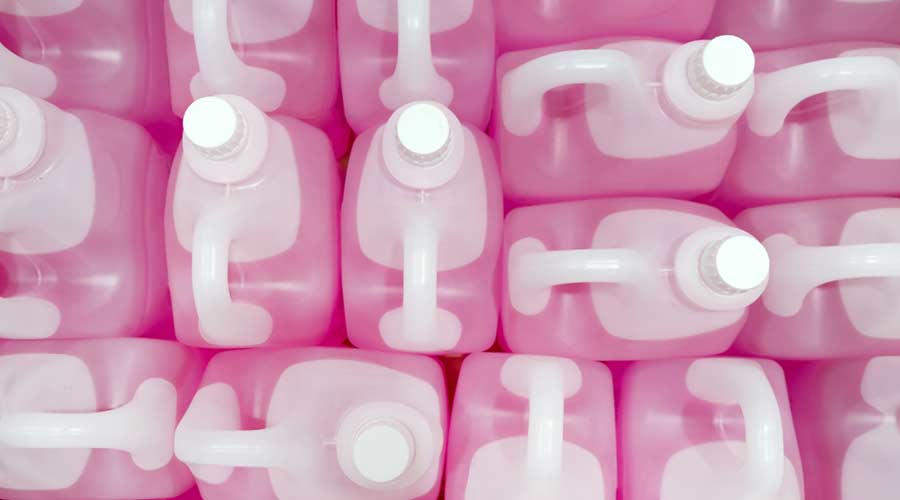
By Doug Flaig
In the early days of the COVID-19 pandemic, the uncertainty surrounding the Coronavirus and its seemingly high mortality rate sparked fear that bordered on panic. Back then, scientists believed the virus could be easily spread by contact with contaminated surfaces or ‘fomites.’ As a result, antibacterial soaps, all-purpose cleaners and hand sanitizers flew off store shelves as people tried to keep the germs off their bodies and out of their environments. Experts even advised us to wipe down all our groceries before we put them away or leave Amazon packages in the sunlight to make sure they were free from the virus.
More than two years later, scientists know a lot more about COVID-19, including the fact that it primarily spreads through the air we breathe, not via the surfaces we touch. Yet, many businesses are still regularly cleaning their surroundings — especially high-touch areas like handrails, doorknobs and light switches — with anti-bacterial cleaners in the hope of killing the virus.
Many experts believe this unnecessary cleaning, as well as the over-use of antibacterial cleaning products, may be doing more harm than good.
Are We Killing Off Good Bacteria?
Bacteria doesn’t necessarily equal bad. There are plenty of examples of good bacteria, like the bacteria in our intestines that help us digest food. But an antibacterial solution is, by definition, a pesticide designed to kill all types of bacteria, regardless of whether they are harmful or beneficial to humans.
An article in Scientific American explains how the overuse of antibacterial products — cleaning solutions, as well as antibacterial hand soaps and sanitizers — may be contributing to the development of stronger bacteria that are resistant to the products we use to kill them.
When antibacterial cleaners are used on a surface, the chemicals kill most, but not all the bacteria. The ones that survive react to the chemicals as if they were stressors and can develop special defenses. When they reproduce, they pass on these defenses, resulting in bacteria that are resistant to disinfectants, as well as antibiotic drugs. These strains increase the risk of infections, especially in hospitals where at-risk patients visit.
The Risks Heath and the Environment
People who regularly clean with antibacterial solutions, especially in commercial settings, wear gloves to protect themselves from exposure to these harsh chemicals. If they come into contact with skin, the chemicals can cause rashes or even burns.
When using these types of products, the room must be properly ventilated. The reason for this is because, if the chemicals are inhaled for an extended period of time, they may cause breathing problems or possibly even lung damage. And that’s if they are used correctly. If they are diluted improperly, for example, the hazards are much greater.
The environmental impact of antibacterial cleaners has been widely acknowledged for some time. Water treatment plants don’t process these chemicals well, so they build up in our streams and rivers creating a toxic environment for fish.
The irony is that, for most situations, less harsh products can be just as effective at washing away the bacteria as antibacterial solutions are at killing it.
Why Green Cleaners are Needed
Overall, people are more environmentally conscious these days, worrying about air and water pollution, climate change and ozone depletion. They recognize that our actions, including the chemicals we produce that make their way into the ground water, will affect our planet for generations.
That’s why more and more cleaning companies have turned to green cleaning, using products free from the harsh chemicals that have lasting impacts on the environment.
By adopting green cleaning measures, businesses can help educate the public that this way of cleaning is not only just as effective as traditional methods, but also safer. Hopefully, with time, people will understand that simply spraying everything down with antibacterial chemicals may be doing more harm than good.
Doug Flaig is the president of Stratus Building Solutions, a janitorial services franchise organization based in North Hollywood, California. Doug has spent over 20 years in the world of multi-unit retail with Dunkin’ Donuts, Burger King, 7-Eleven stores and Wetzel’s Pretzels overseeing hundreds of franchise retail locations. Additionally, he spent 6 years in the "constant whitewater" world of mobile telecom overseeing a team that built and modified cell towers and other telecom infrastructure. Prior to joining Stratus Building Services, he served as chief operating officer with Safe Facility Services, a janitorial services provider headquartered in Thousand Oaks, California.

 Celebrating BSCAI's 60th Anniversary eBook
Celebrating BSCAI's 60th Anniversary eBook The Down and Dirty on Cleaning in Virus Season
The Down and Dirty on Cleaning in Virus Season How Surfactant Use is Expanding in Commercial Cleaning
How Surfactant Use is Expanding in Commercial Cleaning